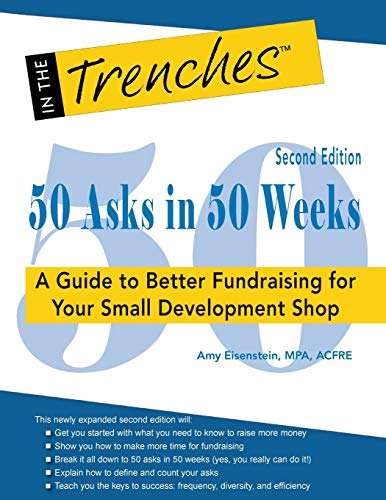50 Asks in 50 Weeks
A Guide to Better Fundraising for Your Small Development Shop
Are you raising money for a nonprofit organisation with a small development office or no paid fundraising staff? Do you want to raise more money? Are you stuck in a rut with your fundraising programme? Do you want to feel motivated and reenergised about fundraising? Do you need an action plan?
Amy Eisenstein, MPA, ACFRE, has written a brilliant development planning tool designed to help nonprofit professionals and board members raise more money for the organisations they love. She provides easy-to-implement strategies and tips that you can implement immediately, without any additional staff or resources. If you are working in a small development shop—or if you ARE the small development shop—you want this book!
By “small development office,” Eisenstein means an organisation with a budget of under $3 million, and/or less than three paid development staff members. This includes a “zero“ development staff shop, which is an organisation with no paid development staff member and where the executive director/CEO, programme staff, and/or volunteers are responsible for all the fundraising.
Why 50 Asks?
Eisenstein has observed that staff members in average, small development offices make far fewer than 50 asks per year—and receive far fewer gifts.
While 50 is a somewhat arbitrary number, it still represents a marked increase over what most small development staff shops are doing now. Most importantly, it’s an achievable number.
50 Asks in 50 Weeks, Second Edition will help you:
- Raise more money
- Create a basic development plan
- Identify new prospects
- Ask for gifts more frequently
- Review the basics of fundraising
- Work with your board on fundraising
- Hire your first development staff member
- Work as a cohesive development team with your executive director/CEO, development staff members, and board members
This expanded edition is a development planning workbook. By the time you’ve finished it you will have created a basic annual development plan by focusing on three important aspects:
- The significance of asking for gifts frequently
- The importance of having a diverse funding base
- The impact of asking in the smartest possible way
Eisenstein focuses on these three pillars of successful fundraising (instead of just the first) because, although the focus of the concept of 50 Asks in 50 Weeks is on asking more frequently, having a diverse funding base is also critical to your success. The third aspect, asking in the smartest possible way, recognises the danger in focusing too much on frequency—doing so leads to making the kinds of mistakes that actually result in a decrease in gifts.
Eisenstein doesn’t mince words. As she stated in her first edition (2013), she continues to remind you that successful fundraising requires taking action, including getting out of your chair, picking up your phone, and meeting with donors.
Eisenstein also addresses a big reason you may not be raising the kind of money you could: the ways you are spending your time. This isn’t just about being overworked (though that’s part of it). Frequently, “asking for gifts” falls to the bottom of a long list of urgent, but ultimately less important, work. Even experienced fundraisers can get sidetracked with tasks ranging from event planning to managing the database or writing thank-you letters. While extremely important, though, these tasks (among many others) don’t lead directly to any additional income for the organization.
To raise more money, you must move asking back to the top of your priority list. Eisenstein shows you how.
About Amy M Eisenstein
Amy M. Eisenstein, MPA, CFRE, is the principal and owner of Tri Point Fundraising, a full-service consulting firm for nonprofit organizations and foundations. Her firm serves a wide variety of social service, educational and healthcare organizations.
Before creating Tri Point Fundraising, Amy served for more than 10 years in the nonprofit sector as a director of development for large and small nonprofit organizations. These include the New Jersey Institute for Social Justice, the Associate Alumnae of Douglass College at Rutgers University, and Shelter Our Sisters, a battered-women’s shelter. For these organizations she raised millions of dollars through event planning, grant writing, capital campaigns, direct mail as well as major and planned gift solicitations.
Amy is a frequent speaker at conferences and a facilitator of board retreats. She currently serves on the board of the Association of Fundraising Professionals – New Jersey Chapter and is chair of the 2010 New Jersey Conference on Philanthropy. She received her Master’s Degree in Public Administration and Nonprofit Management from the Wagner Graduate School at New York University and her Bachelor’s Degree from Douglass College at Rutgers University.
Buy on Bookshop.org Buy on Amazon



